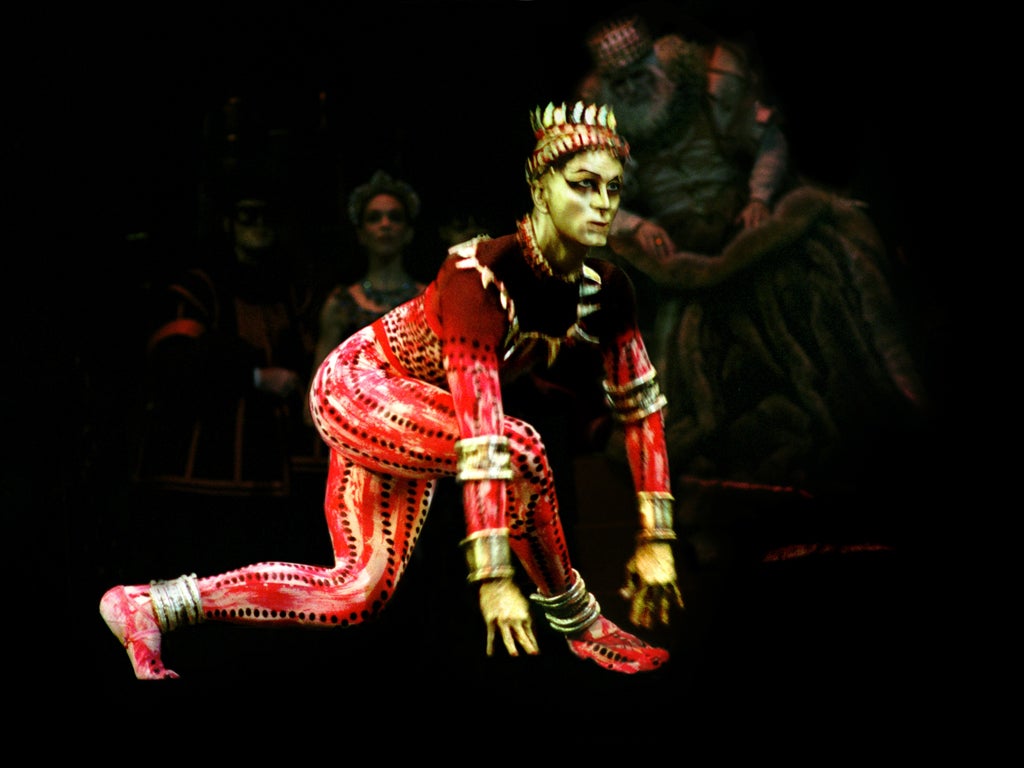The Prince of the Pagodas, Royal Opera House, London
A Gormenghast world that toppled two creative giants

Your support helps us to tell the story
From reproductive rights to climate change to Big Tech, The Independent is on the ground when the story is developing. Whether it's investigating the financials of Elon Musk's pro-Trump PAC or producing our latest documentary, 'The A Word', which shines a light on the American women fighting for reproductive rights, we know how important it is to parse out the facts from the messaging.
At such a critical moment in US history, we need reporters on the ground. Your donation allows us to keep sending journalists to speak to both sides of the story.
The Independent is trusted by Americans across the entire political spectrum. And unlike many other quality news outlets, we choose not to lock Americans out of our reporting and analysis with paywalls. We believe quality journalism should be available to everyone, paid for by those who can afford it.
Your support makes all the difference.Somebody had to do it, sometime. A two-and-a-half-hour score by Britain's greatest composer is not to be consigned to the scrap heap without a fair trial, and nor is the final big ballet of Britain's second-greatest choreographer.
Thus it has fallen to Dame Monica Mason, in her last months as artistic director of the Royal Ballet, to give The Prince of the Pagodas one last chance. She had been assistant to the ailing Kenneth MacMillan in 1989 when he created his version of the ballet to Benjamin Britten's huge, unwieldy score, reworking the failed original made by his friend John Cranko 30 years earlier. Both choreographers had struggled to match Britten's sprawling, glamorous vision of a fairytale Orient. Now at last, 10 years after MacMillan's death, Mason had permission to make the cuts that, she felt, could make it all work.
And yes, it's certainly tighter, but this only makes other problems more pronounced, not least the impression that both Britten and MacMillan were operating in inverted commas, donning hats that neither fitted nor suited them. There are indeed some ravishing stretches of music. Britten's mournful take on Erik Satie is a melody I'm humming still. Also memorable is his glistening extended pastiche of a Balinese gamelan orchestra, using exclusively Western instruments, superbly commanded here by Barry Wordsworth. But you wouldn't guess that this music was by the composer of Death in Venice and A Midsummer Night's Dream.
Similarly, the choreographer who mined his dark side so incisively in big ballets such as Mayerling and small ones such as Las Hermanas, appears floored by the slender outlines of fairytale.
Where the best of such stories bloom in the gaping chasm between goodness and evil, this one is sterile, failing to take root in a too-knowing composite of Sleeping Beauty, King Lear and "The Frog Prince". Which isn't to say that there isn't scope in the plot for psychological complexity, given a senile father, motherless rival siblings and a heroine on the verge of sexual discovery. But MacMillan, with his eye perversely fixed on 19th-century models, denies his own nature and chases the wrong hares.
In a misplaced nod to the pageantry of Petipa's Sleeping Beauty, he sets his tale amid a satirical gaggle of fussing courtiers in oversized specs whom, I fear, we're meant to find funny. In place of Aurora's tender forays into courtship, Princess Rose gets knocked about by a string of vain misogynists. Worse, the true object of her desire (the eastern prince of the title) is turned into a salamander in the first five minutes, condemned to flopping about the floor on his bottom with his emerald-green knees by his nose. Intermittently, he reappears in human form, in the girl's dreams, but this crucial distinction is – despite all the editing – still unclear.
As compensation, the ballet looks glorious, set by the late Nicholas Georgiadis in a Tudor Gormenghast of gilded towers, which slide about like shifting islands to suggest Rose's journey towards self-knowledge. Among the first cast are some fine performances, too, notably from Marianela Nuñez, finding grist in a sugar-pink role; from Tamara Rojo, spitting tacks as her sister; and, in a surprise Mr Nasty turn, Ricardo Cervera as a scarily macho King of the South, with go-faster flaming thighs and a demon leap.
Who would guess that Viktor, the opening work of the month-long Pina Bausch season which kicked off at Sadler's Wells, pre-dates Pagodas by three years? It, too, is an adult fable. It, too, through its tumbled shards of memory and observation, its layers of physical ritual and speech, aims to trace the fates and desires of men and women. Unlike Pagodas, though, its imagery – refracted and absurd – cuts to the quick. Perhaps MacMillan, in his heart of hearts, knew that the story ballet had run its course.
To 29 June (020-7304 4000)
Critic's Choice
There's still time to catch the Royal Ballet's best offering of the year so far: a pairing of Balanchine's abstract Ballo della regina with the world's oldest story ballet – the delicious La Sylphide, set in a Scottish glen. The first is a feast of eye-popping speed, the second a riot of flying kilts, witches' cauldrons and flighty forest sprites. At London's Royal Opera House, Tue & Fri.
Join our commenting forum
Join thought-provoking conversations, follow other Independent readers and see their replies
Comments